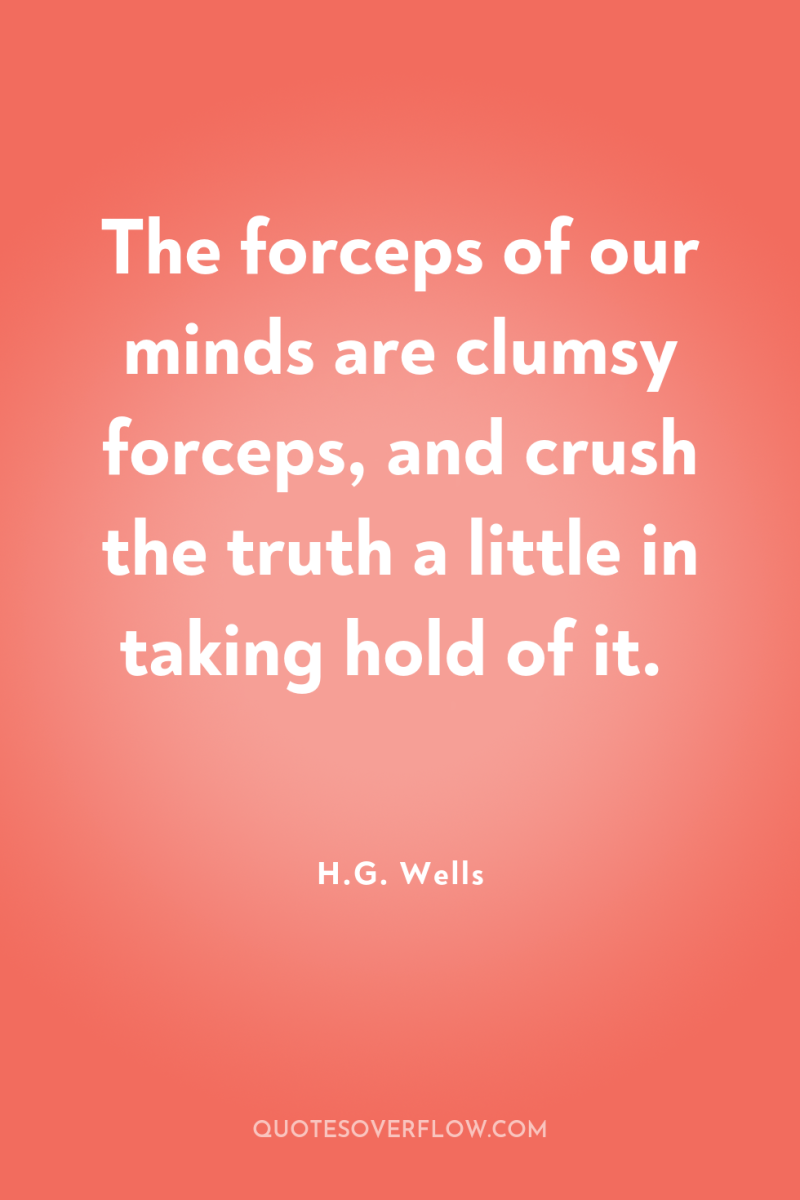
1
The forceps of our minds are clumsy forceps, and crush the truth a little in taking hold of it.H.G. Wells
2
Be a man! ... What good is religion if it collapses under calamity? Think of what earthquakes and floods, wars and volcanoes, have done before to men! Did you think that God had exempted [us]? He is not an insurance agent.H.G. Wells
3
But I have believed always and taught always that what God demands from man is his utmost effort to cooperate and understand. I have taught the imagination, first and most; I have made knowledge, knowledge of what man is and what man's world is and what man may be, which is the adventure of mankind, the substance of all my teaching.H.G. Wells
4
My days I devote to reading and experiments in chemistry, and I spend many of the clear nights in the study of astronomy. There is, though I do not know how there is or why there is, a sense of infinite peace and protection in the glittering hosts of heaven. There it must be, I think, in the vast and eternal laws of matter, and not in the daily cares and sins and troubles of men, that whatever is more than animal within us must find its solace and its hope.H.G. Wells
5
There it must be, I think, in the vast and eternal laws of matter, andnot in the daily cares and sins and troubles of men, that whatever ismore than animal within us must find its solace and its hope. I hope, or Icould not live.H.G. Wells
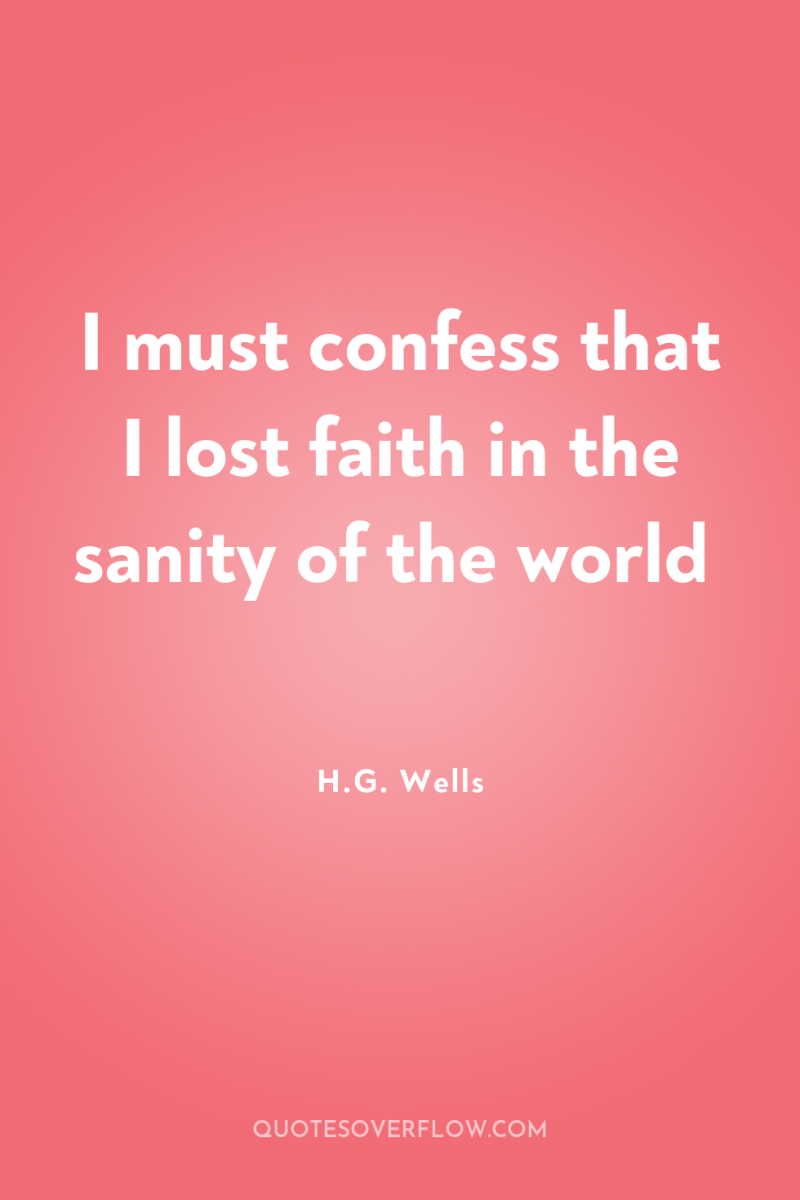
6
I must confess that I lost faith in the sanity of the worldH.G. Wells

7
If you are in difficulties with a book, try the element of surprise: attack it at an hour when it isn't expecting it.H.G. Wells

8
No passion in the world is equal to the passion to alter someone else's draft.H.G. Wells
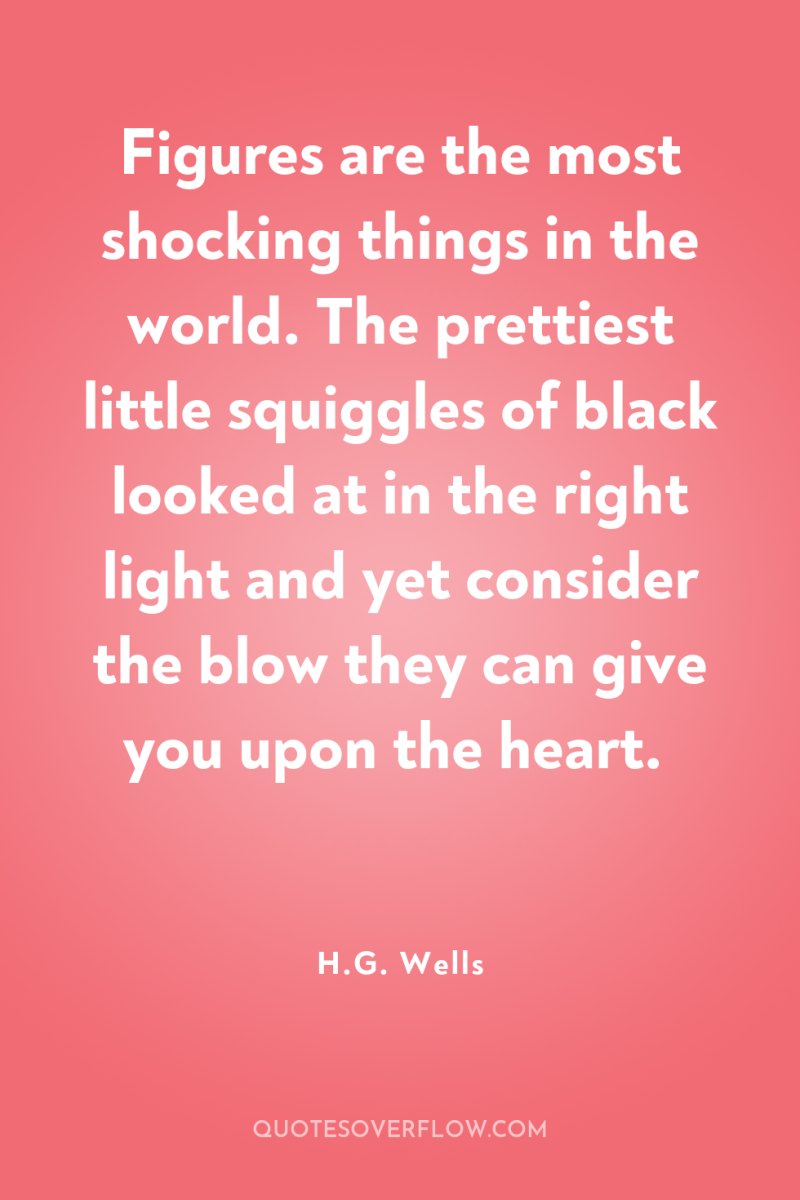
9
Figures are the most shocking things in the world. The prettiest little squiggles of black looked at in the right light and yet consider the blow they can give you upon the heart.H.G. Wells
10
All we can do is to prepare for a universal language that will go on changing for ever. We don’t know everything. We aren’t final. I wish we could make that statement a part of the Fundamental Law.H.G. Wells
11
An immense and ever-increasing wealth of knowledge is scattered about the world today; knowledge that would probably suffice to solve all the mighty difficulties of our age, but it is dispersed and unorganized. We need a sort of mental clearing house for the mind: a depot where knowledge and ideas are received, sorted, summarized, digested, clarified and comparedH.G. Wells
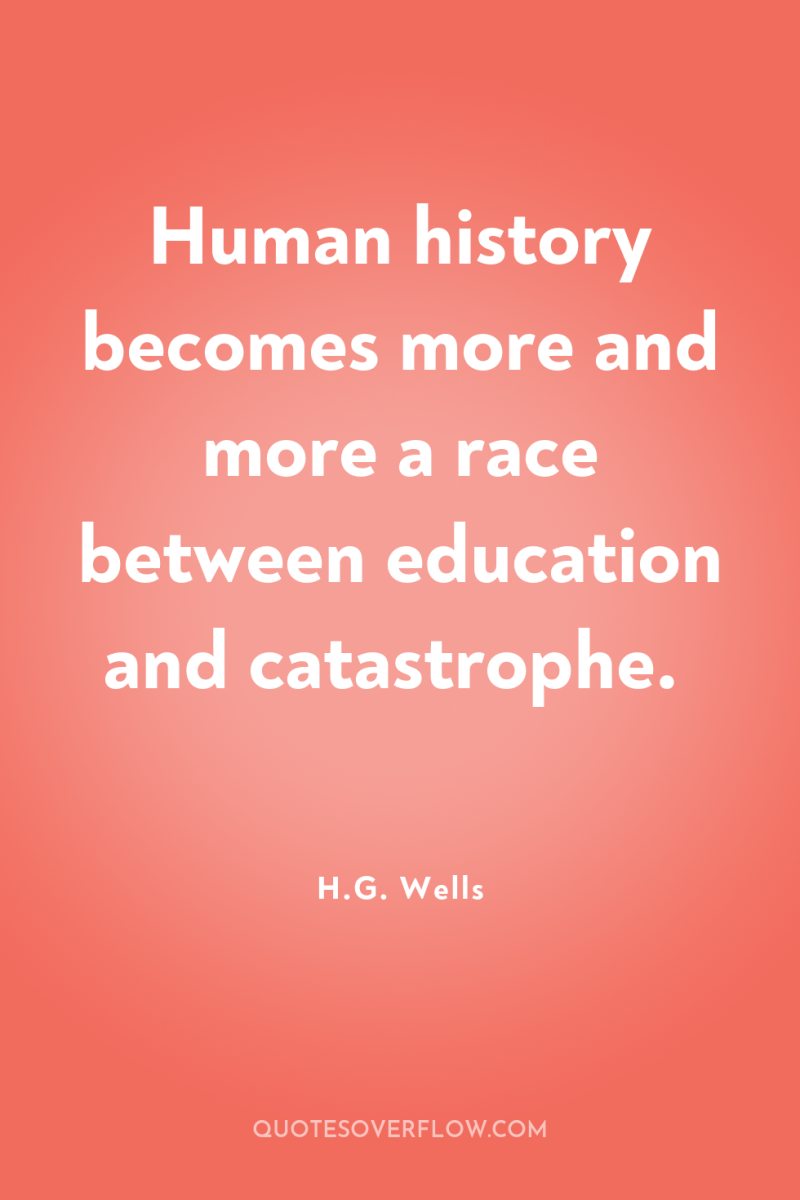
12
Human history becomes more and more a race between education and catastrophe.H.G. Wells
13
Mr. Polly went into the National School at six and he left the private school at fourteen, and by that time his mind was in much the same state that you would be in, dear reader, if you were operated upon for appendicitis by a well-meaning, boldly enterprising, but rather over-worked and under-paid butcher boy, who was superseded towards the climax of the operation by a left-handed clerk of high principles but intemperate habits, –that is to say, it was in a thorough mess.H.G. Wells
14
I tell you, stupidity, self-protective stupidity, is the fundamental sin. No man alive has a right to contentment. No man alive has a right to mental rest. No man has any right to be as stupid as educated, Liberal men have been about that foolish affair at Geneva. Men who have any leisure, any gifts, any resources, have no right to stifle their consciences with that degree of imposture.H.G. Wells
15
But the old traditions of sectarian misdirection still in spite of a certain advance in technical efficiency, cripple and distort the general mind. "All that has been changed, " cry indignant teachers under criticism. But the evidence that this teaching of theirs still fails to produce a public that is alert, critical, and capable of vigorous readjustment in the face of overwhelming danger, is to be seen in the newspapers that satisfy the Tewler public, the arguments and slogans that appeal to it, the advertisements that succeed with it, the stuff it swallows. It is a press written by Homo Tewler for Homo Tewler all up and down the scale. The Times Tewler, the Daily Mail Tewler, the Herald, the Tribune, the Daily Worker; there is no difference except a difference in scale and social atmosphere. Through them all ran the characteristic Tewler streak of willful ignorance, deliberate disingenuousness, and self-protective illusion.H.G. Wells
16
In all the round world of Utopia there is no meat. There used to be. But now we cannot stand the thought of slaughter-houses. And, in a population that is all educated, and at about the same level of physical refinement, it is practically impossible to find anyone who will hew a dead ox or pig. We never settled the hygienic question of meat-eating at all. This other aspect decided us. I can still remember, as a boy, the rejoicings over the closing of the last slaughter-house. .H.G. Wells

17
...and spend my days surrounded by wise books, - bright windows in this life of ours, lit by the shining souls of men.H.G. Wells
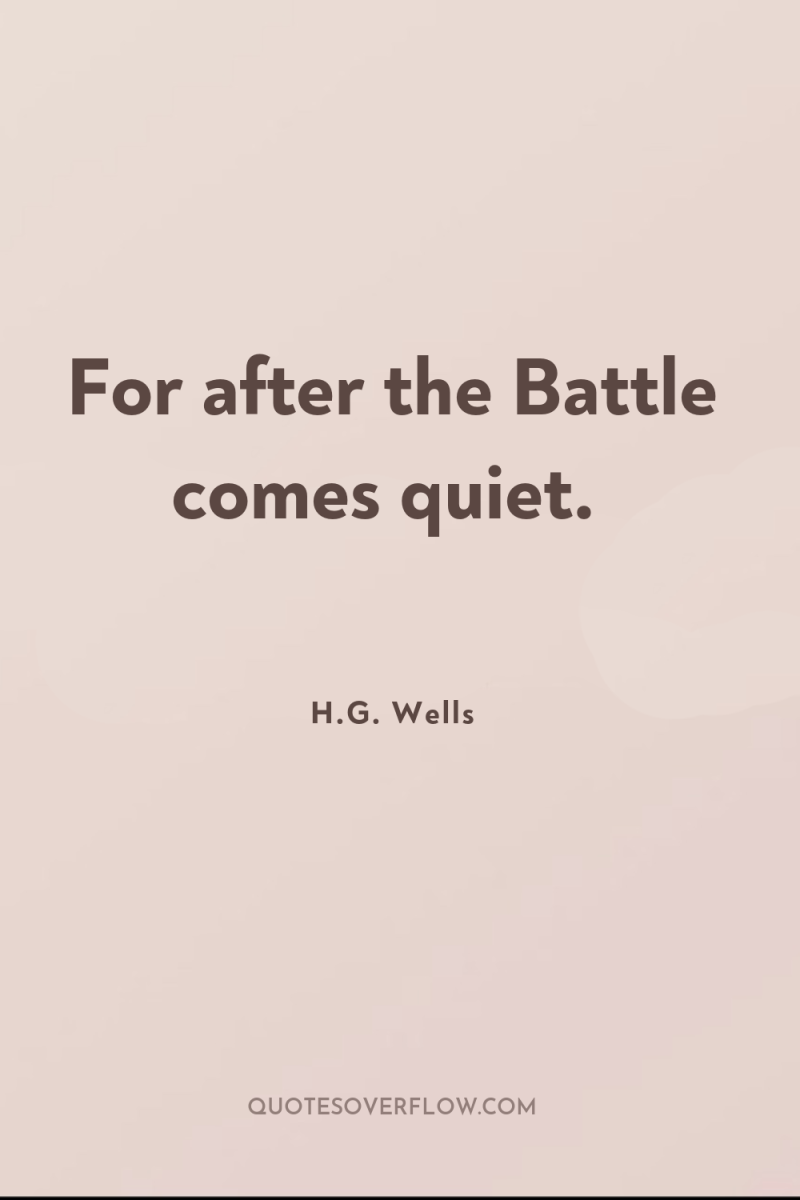
18
For after the Battle comes quiet.H.G. Wells
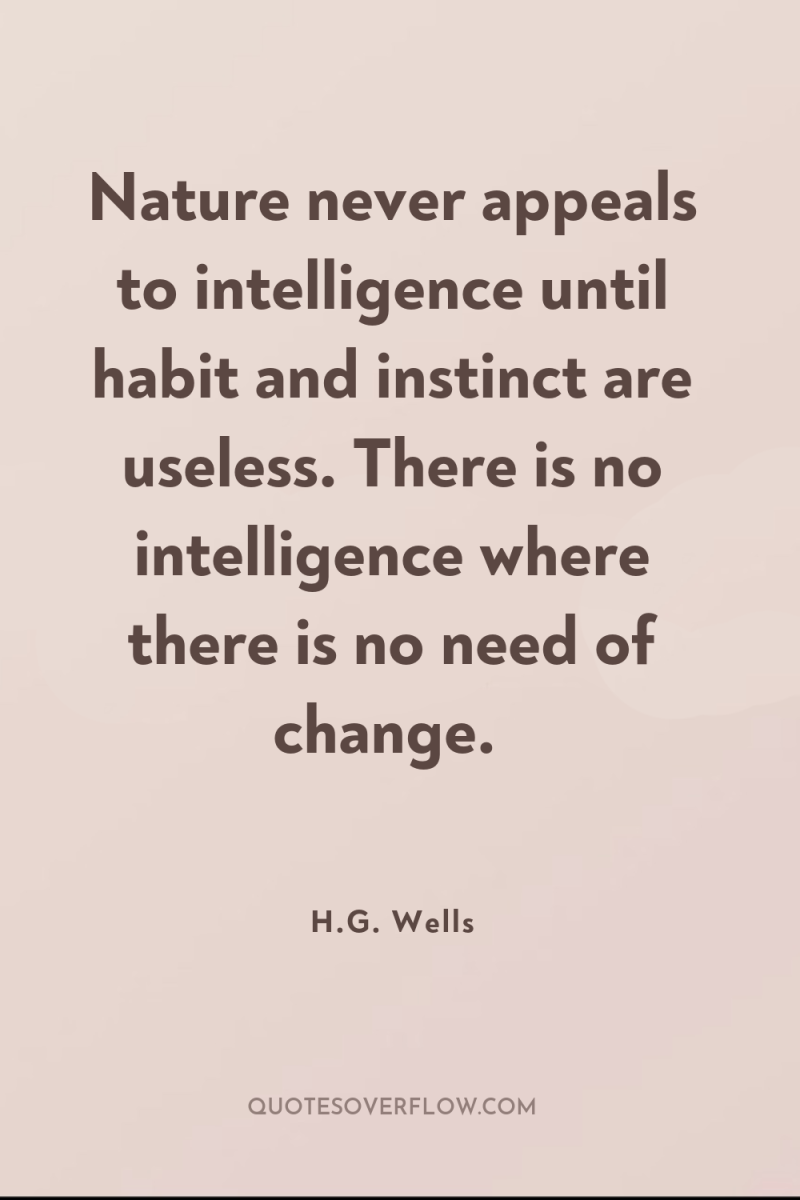
19
Nature never appeals to intelligence until habit and instinct are useless. There is no intelligence where there is no need of change.H.G. Wells
20
After all, the sanitation and the agriculture of today are still in the rudimentary stage. The science of our time has attacked but a little department of the field of human disease, but even so, it spreads its operations very steadily and persistently. Our agriculture and horticulture destroy a weed just here and there and cultivate perhaps a score or so of wholesome plants, leaving the greater number to fight out a balance as they can. We improve our favourite plants and animals--and how few they are--gradually by selective breeding; now a new and better peach, now a seedless grape, now a sweeter and larger flower, now a more convenient breed of cattle. We improve them gradually, because our ideals are vague and tentative, and our knowledge is very limited; because Nature, too, is shy and slow in our clumsy hands. Some day all this will be better organized, and still better. That is the drift of the current in spite of the eddies. .H.G. Wells
21
The development of the telescope marks, indeed, a new phase in human thought, a new vision of life. It is an extraordinary thing that the Greeks, with their lively and penetrating minds, never realized the possibilities of either microscope or telescope. They made no use of the lens. Yet they lived in a world in which glass had been known and had been made beautiful for hundreds of years; they had about them glass flasks and bottles, through which they must have caught glimpses of things distorted and enlarged. But science in Greece was pursued by philosophers in an aristocratic spirit, men who, with a few such exceptions as the ingenious Archimedes and Hiero, were too proud to learn from such mere artisans as jewellers and metal- and glass-workers. Ignorance is the first penalty of pride. The philosopher had no mechanical skill and the artisan had no philosophical education, and it was left for another age, more than a thousand years later, to bring together glass and the astronomer.( The Earth in Space and Time §1).H.G. Wells
22
Without world unification the species would destroy itself by the enlarged powers that had come to it. This, said the men of science, is no theory, no political alternative; it is a statement of fact. Men had to pool their political, economic and educational lives. There was no other way for them but a series of degenerative phases leading very plainly to extinction. They could not revert now. They had to go on – up or down. They had gone too far with civilisation and in societies, to sink back into a merely “animal” life again. The hold of the primates on life had always been a precarious one. Except where they were under human protection all the other great apes were extinct. Now plainly man had to go on to a larger life, a planetary existence, or perish in his turn. .H.G. Wells

23
(...) and spend my days surrounded by wise books, - bright windows in this life of ours, lit by the shining souls of men.H.G. Wells
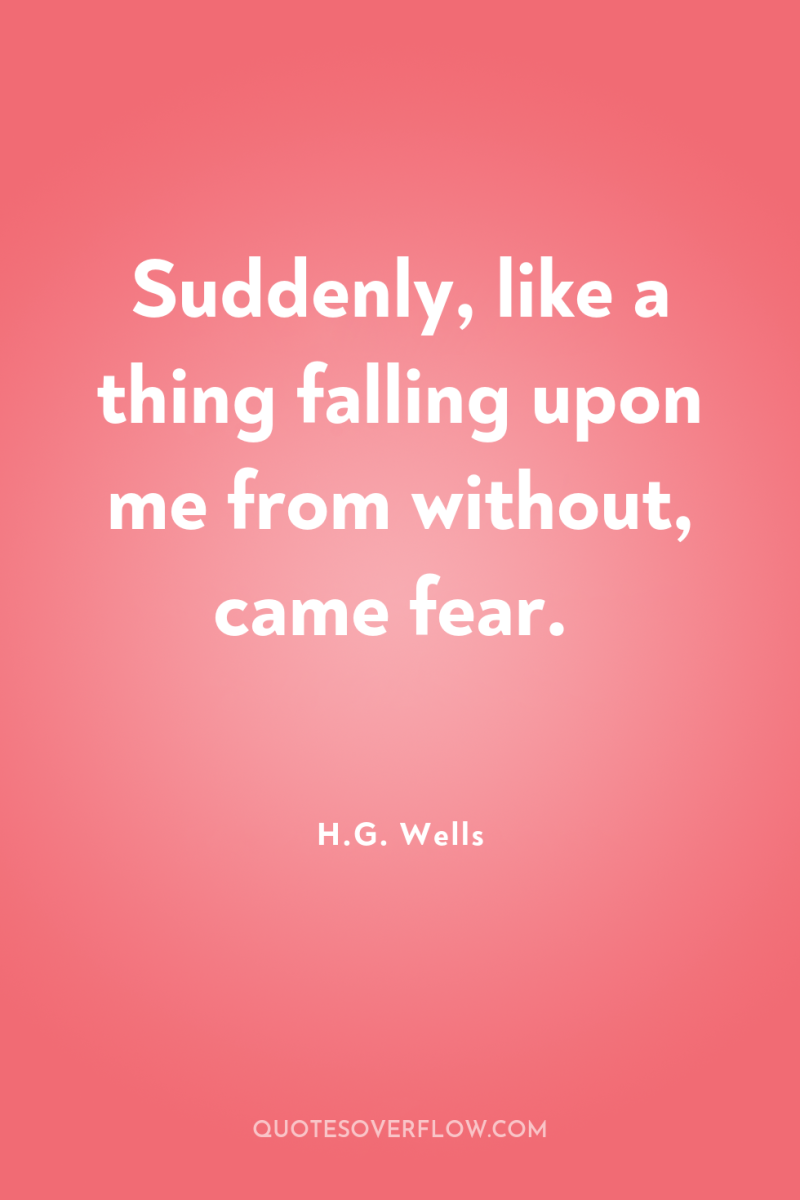
24
Suddenly, like a thing falling upon me from without, came fear.H.G. Wells
25
The crying sounded even louder out of doors. It was as if all the pain in the world had found a voice. Yet had I known such pain was in the next room, and had it been dumb, I believe– I have thought since– I could have stood it well enough. It is when suffering finds a voice and sets our nerves quivering that this pity comes troubling us. But in spite of the brilliant sunlight and the green fans of the trees waving in the soothing sea-breeze, the world was a confusion, blurred with drifting black and red phantasms, until I was out of earshot of the house in the stone wall.H.G. Wells
26
You have dwelt overmuch upon pain. Pain is a swift distress; it ends and is forgotten. Without memory and fear pain is nothing, a contradiction to be heeded, a warning to be taken. Without pain what would life become? Pain is the master only of craven men. It is in man's power to rule it.H.G. Wells

27
Find the thing you want to do most intensely, make sure that’s it, and do it with all your might. If you live, well and good. If you die, well and good. Your purpose is doneH.G. Wells
28
The world, I tell you, is bored -- bored now to the explosive pitch. It's bored by all this incessant war preparation. It is bored by aimless violence, now here, now there. It is tired of hatred politics. It's tired of fresh murders every day. It is not indignant, not excited; it is bored. Bored and baffled.." I don't believe a man begins to know anything of politics until he realises the immense menace of mental fatigue, of world-wide mass boredom. It accumulates. It makes the most frightful convulsions and demoralisation possible. It makes them at last inevitable. Nobody wants fundamental changes in a world where hope and interest prevail. Then people accept their careers, settle down to them, rear children. But throw them out of work, in and out and no sense of security, deprive them of bright expectations, regiment them in masses, underfeed them, bore them with organised mass patriotism, and they begin to seep together into a common morass of discontent and impatience. Almost unconsciously.." They're like that now.H.G. Wells
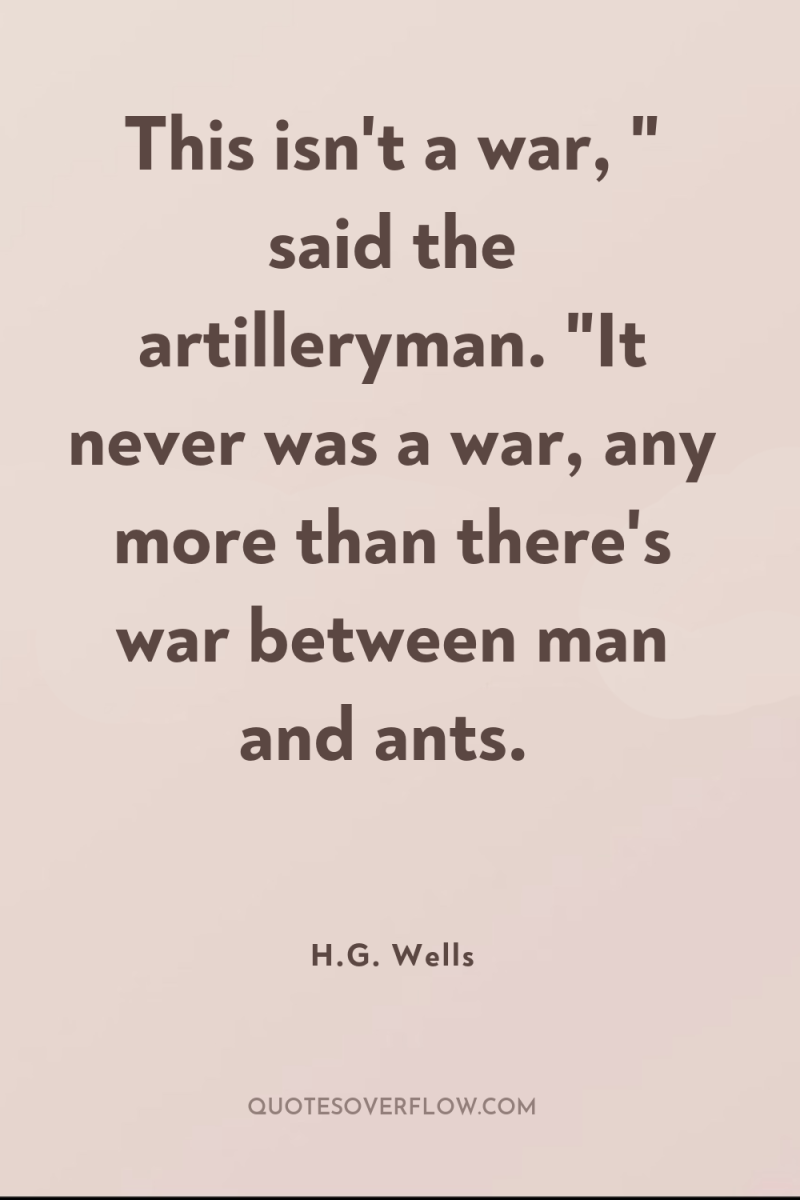
29
This isn't a war, " said the artilleryman. "It never was a war, any more than there's war between man and ants.H.G. Wells
30
A time will come when a politician who has wilfully made war and promoted international dissension will be as sure of the dock and much surer of the noose than a private homicide. It is not reasonable that those who gamble with men's lives should not stake their own.H.G. Wells
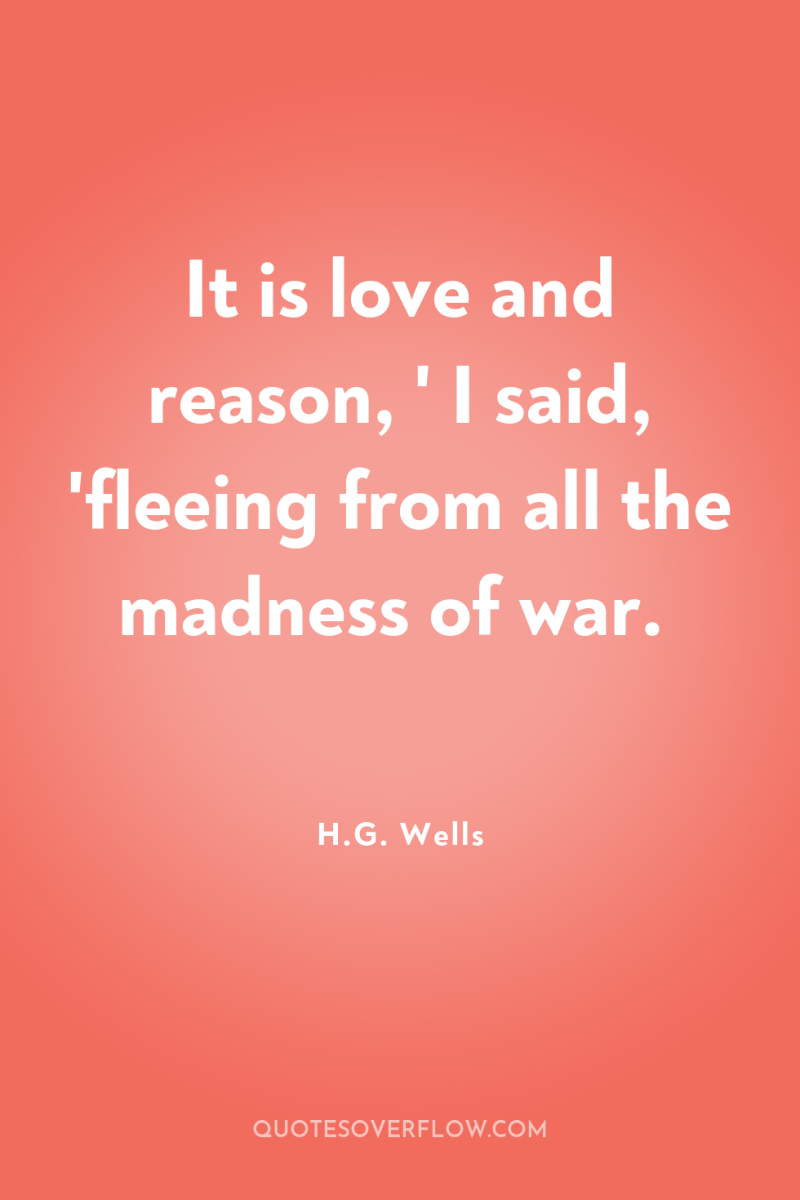
31
It is love and reason, ' I said, 'fleeing from all the madness of war.H.G. Wells
32
Dr. Chanter, in his brilliant History of Human Thought in the Twentieth Century, has made the suggestion that only a very small proportion of people are capable of acquiring new ideas of political or social behaviour after they are twenty-five years old. On the other hand, few people become directive in these matters until they are between forty and fifty. Then they prevail for twenty years or more. The conduct of public affairs therefore is necessarily twenty years or more behind the living thought of the times. This is what Dr. Chanter calls the "delayedrealisation of ideas". In the less hurried past this had not been of any great importance, but in the violent crises of the Revolutionary Period it became a primary fact. It is evident now that whatever the emergency, however obvious the new problem before our species in the nineteen-twenties, it was necessary for the whole generation that had learned nothing and could learn nothing from the Great War and its sequelae, to die out before any rational handling of world affairs could even begin. The cream of the youth of the war years had been killed; a stratum of men already middle-aged remained in control, whose ideas had already set before the Great War. It was, says Chanter, an inescapable phase. The world of the Frightened Thirties and the Brigand Forties was under the dominion of a generation of unteachable, obstinately obstructive men, blinded men, miseducating, misleading the baffled younger people for completely superseded ends. If they could have had their way, they would have blinded the whole world for ever. But the blinding was inadequate, and by the Fifties all this generation and its teachings and traditions were passing away, like a smoke-screen blown aside. Before a few years had passed it was already incredible that in the twenties and thirties of the twentieth century the whole political life of the world was still running upon the idea of competitive sovereign empires and states. Men of quite outstanding intelligence were still planning and scheming for the "hegemony" of Britain or France or Germany or Japan; they were still moving their armies and navies and air forces and making their combinations and alliances upon the dissolving chess-board of terrestrial reality. Nothing happened as they had planned it; nothing worked out as they desired; but still with a stupefying inertia they persisted. They launched armies, they starved and massacred populations. They were like a veterinary surgeon who suddenly finds he is operating upon a human being, and with a sort of blind helplessness cuts and slashes more and more desperately, according to the best equestrian rules. The history of European diplomacy between 1914 and 1944 seems now so consistent a record of incredible insincerity that it stuns the modern mind. At the time it seemed rational behaviour. It did not seem insincere. The biographical material of the period -- and these governing-class people kept themselves in countenance very largely by writing and reading each other's biographies -- the collected letters, the collected speeches, the sapient observations of the leading figures make tedious reading, but they enable the intelligent student to realise the persistence of small-society values in that swiftly expanding scene. Those values had to die out. There was no other way of escaping from them, and so, slowly and horribly, that phase of the moribund sovereign states concluded. .H.G. Wells
![A [national] flag has no real significance for peaceful uses.](https://cdn.quotesoverflow.com/file/quotesoverflow/images/a-national-flag-has-no-real363484563679-1200.webp)
33
A [national] flag has no real significance for peaceful uses.H.G. Wells
34
But in truth, a general prohibition in a state may increase the sum of liberty, and a general permission may diminish it. It does not follow, as these people would have us believe, that a man is more free where there is least law and more restricted where there is most law.H.G. Wells
35
Why did every human concern clog itself up in a tangle of routines, formalities, disciplines, imperatives? Why couldn’t one be free? Really free? Guarding one’s freedom, wasn’t freedom at all. Why couldn’t one win one’s freedom for good and all, and get on with life?H.G. Wells
36
And she wanted to be free. It wasn't Mr. Brumley she wanted; he was but a means – if indeed he was a means – to an end. The person she wanted, the person she had always wanted – was herself. Could Mr. Brumley give her that? Would Mr. Brumley give her that? Was it conceivable he would carry sacrifice to such a pitch as that?...H.G. Wells
37
She had learnt many things since the days of her first rebellion, and she knew now that this matter of the man friend and nothing else in the world is the central issue in the emancipation of women. The difficulty of him is latent in every other restriction of which women complain. The complete emancipation of women will come with complete emancipation of humanity from jealousy – and no sooner. All other emancipations are shams until a woman may go about as freely with this man as with that, and nothing remains for emancipation when she can. .H.G. Wells
38
It was a red-flannel chest-protector, one of those large quasi-hygienic objects that with pills and medicines take the place of beneficial relics and images among the Protestant peoples of Christendom.H.G. Wells
39
It was his first definite encounter with the wary-eyed, platitudinous, evasive Labour leaders, and he realised at once the formidable barrier ofinert leadership they constituted, between the discontented masses and constructive change. They seemed to be almost entirely preoccupied byinternecine intrigues and the "discipline of the Party". They were steeped in Party professionalism. They were not in any way traitors to their cause, or wilfully reactionary, but they had no minds for a renascent world. They meant nothing, but they did not know they meant nothing. They regarded Rud just as in their time they had regarded Liberalism, Fabianism, Communism, Science, suspecting them all, learning nothing from them, blankly resistant. They did not want ideas in politics. They just wanted to be the official representatives of organised labour and make what they could by it. Their manner betrayed their invincible resolution, as strong as an animal instinct, to play politics according to the rules, to manoeuvre for positions, to dig themselves into positions -- and squat..H.G. Wells
40
He came away with an exasperated sense of failure. He denounced parliamentary government root and branch that night. Parliament was doomed. The fact that it had not listened to Rud was only one little conclusive fact in a long indictment. "It has become a series of empty forms, " he said. "All over the world, always, the sawdust of reality is running out of the shapes of quasi-public things. Not one British citizen in a thousand watches what is done in Parliament; not one in a thousand Americans follows the discourses of Congress. Interest has gone. Every election in the past thirty years has been fought on gross misunderstandings.H.G. Wells
41
We have nothing to destroy, " said Rud. "All these things are done for already. They are falling in all over the world. They are dead. No need for destructive activities. But if we have nothing to destroy we have much to clear away. That's different. What is needed is a brand-new common-sense reorganisation of the world's affairs, and that's what we have to give them. I can't imagine how the government sleeps of nights. I should lie awake at night listening all the time for the trickle of plaster that comes before a smash. Ever since they began blundering in the Near East and Spain, they've never done a single wise thing. This American adventure spells disaster. Plainly. Australia has protested already. India now is plainly in collapse. Everyone who has been there lately with open eyes speaks of the vague miasma of hatred in the streets. We don't get half the news from India. Just because there exists no clear idea whatever of a new India, it doesn't mean that the old isn't disintegrating. Things that are tumbling down, tumble down. They don'twait to be shown the plans of the new building. The East crumbles. All over the world it becomes unpleasant to be a foreigner, but an Englishman now can't walk in a bazaar without a policeman behind him.. .H.G. Wells
42
Public men in America are too public. Too accessible. This sitting on the stoop and being 'just folk' was all very well for local politics and the simple farmer days of a hundred years ago, but it's no good for world affairs. Opening flower-shows and being genial to babies and all that is out of date. These parish politics methods have to go. The ultimate leader ought to be distant, audible but far off. Show yourself and then vanish into a cloud. Marx would never have counted for one tenth of his weight as 'Charlie Marx' playing chess with the boys, and Woodrow Wilson threw away all his magic as far as Europe was concerned when he crossed the Atlantic. Before he crossed he was a god -- what a god he was! After he arrived he was just a grinning guest. I've got to be the Common Man, yes, but not common like that. .H.G. Wells
43
You English, " said Steenhold."You Americans, " said Rud."When you aren't as fresh as paint, " he said, "you Americans are as stale as old cabbage leaves. I'm amazed at your Labour leaders, at the sort of things you can still take seriously as Presidential Candidates. These leonine reverberators tossing their manes back in order to keep their eyes on the White House -- they belong to the Pleistocene. We dropped that sort of head in England after John Bright. When the Revolution is over and I retire, I shall retire as Hitler did, to some remote hunting-lodge, and we'll have the heads of Great Labour Leaders and Presidential Hopes stuck all round the Hall. Hippopotami won't be in it.H.G. Wells
44
These politicians impressed him as being the most shortsighted and sceptical men he had ever met. They lived in a little world that was bounded on the one side by "office" and on the other by the constituencies, and they seemed unable to imagine that it was not an eternal world. One tall man, he observed, in the year of grace 1941 was wearing a long frock-coat and a peculiar half-stiff collar reminiscent of that great parliamentary hand, Mr. Gladstone. They talked with one another about divisions; the government majority had dropped to twenty; and they talked about a scene in the House. The P.M.'s manners were becoming intolerable. Then with an air of relaxation they turned to Rud. The possibility of altering opinions in the constituencies seemed a very theoretical one to them. No doubt there were these waves of opinion in the country, and an intelligent parliamentary politician observed them and dodged about among them, but it was quite outside their technique to consider how the pressures of opinion could accumulate and be directed.H.G. Wells
45
Things were rather larger, more obvious and rougher on the American side, but the issues were essentially the same. The general public voted and demonstrated, but its voting seemed to lead to nothing. It felt that things were done behind its back and over its head but it could never understand clearly how. It never seemed able to get sound news out of its newspapers nor good faith out of its politicians. It resisted, it fumbled, it was becoming more and more suspicious and sceptical, but it was profoundly confused and ill-informed.H.G. Wells
46
They despite and hate the government more and more, but they don't know how to set about changing it. The country is dying for some sort of lead, and so far all it is getting is a crowd of fresh professional leaders. Who never get anywhere. Who do not seem to be aiming anywhere. We are living in a world of jaded politics. Poverty increases, prices rise, unemployment spreads, mines, factories stagnate, and nothing is done.H.G. Wells
47
It doesn't take ten years of study, you don't need to go to the University, to find out that this is a damned good world gone wrong. Gone wrong, because it is being monkeyed with by people too greedy and mean and wrong-hearted altogether to do the right thing by our common world. They've grabbed it and they won't let go. They might lose their importance; they might lose their pull. Everywhere it's the same. Beware of the men you make your masters. Beware of the men you trust. We've only got to be clear-headed to sing the same song and play the same game all over the world, we common men. We don't want Power monkeyed with, we don't want Work and Goods monkeyed with, and, above all, we don't want Money monkeyed with. That's the elements of politics everywhere. When these things go wrong, we go wrong. That's how people begin to feel it and see it in America. That's how we feel it here -- when we look into our minds. That's what common people feel everywhere. That'swhat our brother whites -- "poor whites" they call them -- in those towns in South Carolina are fighting for now. Fighting our battle. Why aren't we with them? We speak the same language; we share the same blood. Who has been keeping us apart from them for a hundred and fifty-odd years? Ruling classes. Politicians. Dear old flag and all that stuff! Our school-books never tell us a word about the American common man; and his school-books never tell him a word about us. They flutter flags between us to keep us apart. Split us up for a century and a half because of some fuss about taxing tea. And what are our wonderful Labour and Socialist and Communist leaders doing to change that? What are they doing to unite us English-speaking common men together and give us our plain desire? Are they doing anything more for us than the land barons and thefactory barons and the money barons? Not a bit of it! These labour leaders of to-day mean to be lords to-morrow. They are just a fresh set of dishonest trustees. Look at these twenty-odd platforms here! Mark their needless contradictions! Their marvellous differences on minor issues. 'Manoeuvres! ' 'Intrigue.' 'Personalities.' 'Monkeying.' 'Don't trust him, trust me! ' All of them at it. Mark how we common men are distracted, how we are set hunting first after one red herring and then after another, for the want of simple, honest interpretation..H.G. Wells
48
The whole world, " he said, "is going Radical again. Fundamentally. In religion. In politics. In law. The Common Man has been trying to get his Radicalism said and done plainly and clearly for a hundred and fifty years. Now we take it on. Our movement. The new wave of attack." "And fill a ditch in our turn, " said Irwell. "Maybe we're over the last ditch, " said Rud. "There must be a last ditch somewhere.." All other revolutionary movements have been experiments so far, Christianity, the French Revolution, the Russian Revolution, and more or less failures. They were experiments in liberation and they did not liberate. The old things wriggled back. But ours may be the experiment that succeeds. We may get to the Common-sense World State. Yes -- we -- in this room.. Why not? It has to come somehow, somewhen.. If it doesn't come pretty soon, there won't be much of humanity left to liberate.H.G. Wells
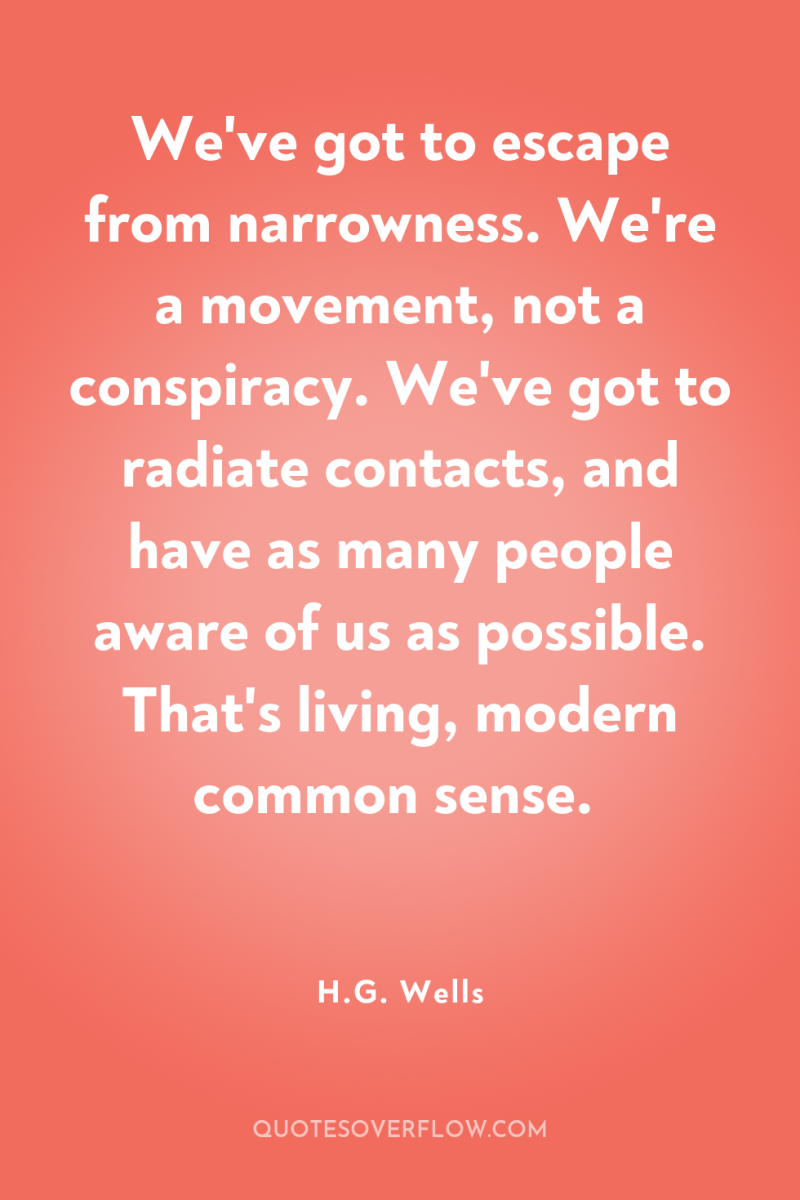
49
We've got to escape from narrowness. We're a movement, not a conspiracy. We've got to radiate contacts, and have as many people aware of us as possible. That's living, modern common sense.H.G. Wells
50
But nowadays -- Our weakness for the last few years has been the ineffectiveness of the Opposition. This Labour Party has never had the quality of a fighting Opposition. It has just sucked the life out of Radicalism. It has never had the definite idealism of the Whigs and Liberals. 'Give us more employment and slightly higher pay and be sure of our contentment, ' says Labour. 'We're loyal. We know our place. But we don't like being unemployed.' What good is that as Opposition? It's about as much opposition as a mewing cat. We mean more than that. I tell you frankly. Our task, I take it, my task, is to reinstate that practical working Opposition which has always been Old England's alternative line of defence.. For the good of all of us..H.G. Wells
51
Look at the way people have swung through Communism, Toryism, Liberalism -- in vast blocks. In my father's boyhood you were either a Liberal or a Conservative in England, and there you stuck, and in America you were a sturdy individualist Democrat or Republican from the cradle to the grave. But now the Voice does it -- the pervading voice. And just nowit's come to a point when a Voice -- putting it straight and clear. Straight and clear..H.G. Wells
52
They did not think politics was a great constructive process, they thought it was a kind of dog-fight. They wanted fun, they wanted spice, they wanted hits, they wanted also a chance to say "'Ear, 'ear! " in an intelligent and honourable manner and clap their hands and drum with their feet. The great constructive process in history gives so little scope for clapping and drumming and saying "'Ear, 'ear! " One might as well think of hounding on the solar system.H.G. Wells
53
The only path of escape he could conceive as yet for Lady Harman lay through the chivalry of some other man. That a woman could possibly rebel against one man without the sympathy and moral maintenance of another was still outside the range of Mr. Brumley's understanding. It is still outside the range of most men's understandings -- and of a great many women's.H.G. Wells
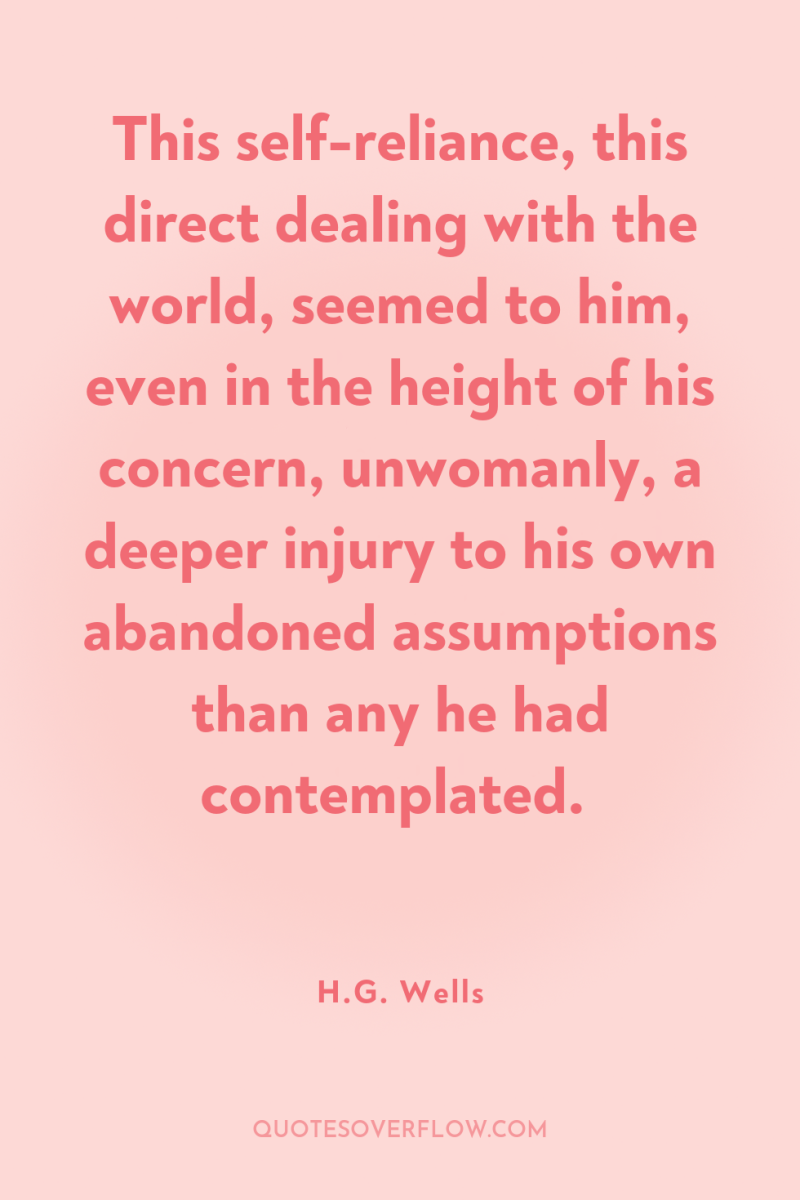
54
This self-reliance, this direct dealing with the world, seemed to him, even in the height of his concern, unwomanly, a deeper injury to his own abandoned assumptions than any he had contemplated.H.G. Wells
55
He perceived too in these still hours how little he had understood her hitherto. He had been blinded, – obsessed. He had been seeing her and himself and the whole world far too much as a display of the eternal dualism of sex, the incessant pursuit. Now with his sexual imaginings newly humbled and hopeless, with a realization of her own tremendous minimization of that fundamental of romance, he began to see all that there was in her personality and their possible relations outside that. He saw how gravely and deeply serious was her fine philanthropy, how honest and simple and impersonal her desire for knowledge and understandings. There is the brain of her at least, he thought, far out of Sir Isaac's reach. She wasn't abased by her surrenders, their simplicity exalted her, showed her innocent and himself a flushed and congested soul. He perceived now with the astonishment of a man newly awakened just how the great obsession of sex had dominated him – for how many years? Since his early undergraduate days. Had he anything to put beside her own fine detachment? Had he ever since his manhood touched philosophy, touched a social question, thought of anything human, thought of art, or literature or belief, without a glancing reference of the whole question to the uses of this eternal hunt? During that time had he ever talked to a girl or woman with an unembarrassed sincerity? He stripped his pretences bare; the answer was no. His very refinements had been no more than indicative fig-leaves. His conservatism and morality had been a mere dalliance with interests that too brutal a simplicity might have exhausted prematurely. And indeed hadn't the whole period of literature that had produced him been, in its straining purity and refinement, as it were one glowing, one illuminated fig-leaf, a vast conspiracy to keep certain matters always in mind by conspicuously covering them away? But this wonderful woman – it seemed – she hadn't them in mind! She shamed him if only by her trustful unsuspiciousness of the ancient selfish game of Him and Her that he had been so ardently playing.. He idealized and worshipped this clean blindness. He abased himself before it.H.G. Wells
56
We should strive to welcome change and challenges, because they are what help us grow. With out them we grow weak like the Eloi in comfort and security. We need to constantly be challenging ourselves in order to strengthen our character and increase our intelligence.H.G. Wells
57
It is a law of nature we overlook, that intellectual versatility is the compensation for change, danger, and trouble. An animal perfectly in harmony with its environment is a perfect mechanism. Nature never appeals to intelligence until habit and instinct are useless. There is no intelligence where there is no change and no need of change. Only those animals partake of intelligence that have a huge variety of needs and dangers.H.G. Wells
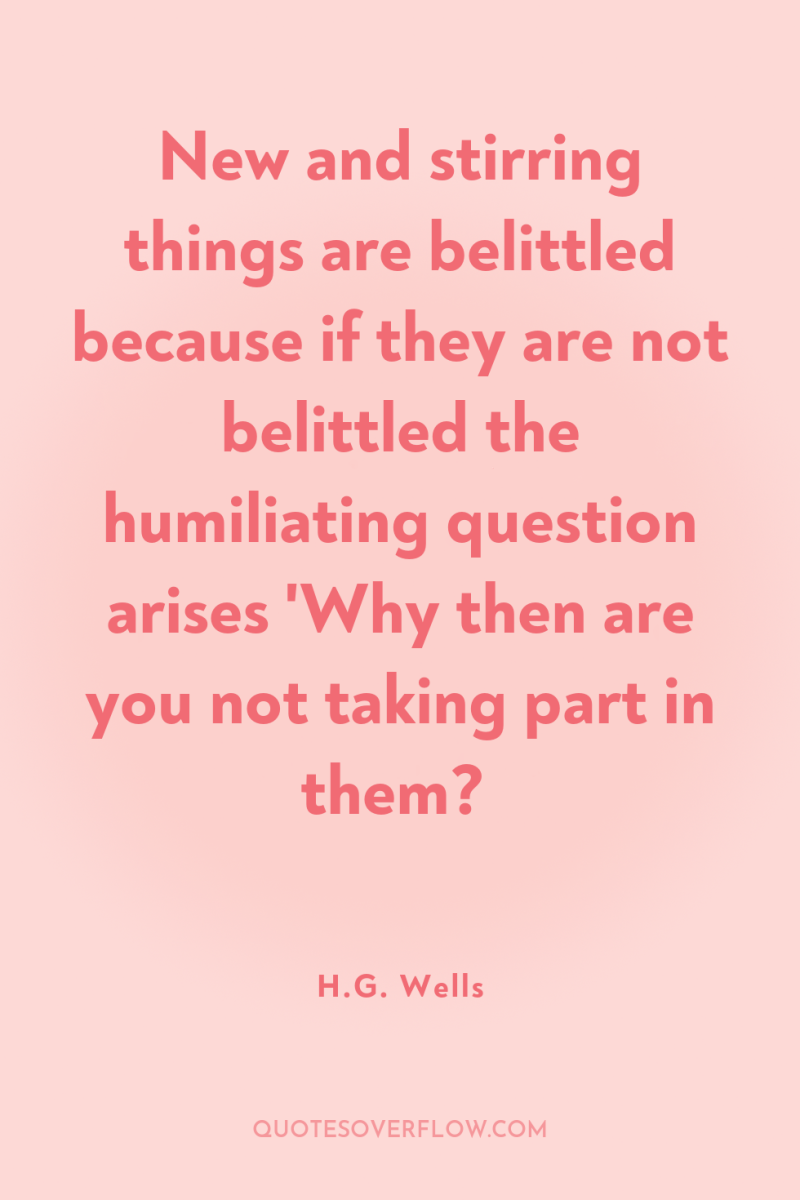
58
New and stirring things are belittled because if they are not belittled the humiliating question arises 'Why then are you not taking part in them?H.G. Wells
59
Oh, Lord! don't I know it's difficult! .. Don't I know that perhaps it's impossible! But it's the only way to do it. Therefore, I say, let's try to get it done. And everybody says, 'difficult, difficult, ' and nobody lifts a finger to try. And the only real difficulty is that everybody for one reason or another says that it's difficult. It's against human nature. Granted! Every decent thing is. It's socialism. Who cares? .H.G. Wells
60
A certain beauty in the world is no mark of God's favor, said Mr. Huss. There is no beauty one may not balance by an equal ugliness. The warthog and the hyena, the tapeworm and the stinkhorn, are equally God's creations. Nothing you have said points to anything but a cold indifference towards us of this order in which we live. Beauty happens; it is not given. Pain, suffering, happiness; there is no heed. Only in the heart of man burns the fire of righteousness.H.G. Wells

61
You can't see beauty with miserable eyes.H.G. Wells
62
They know they dare not have their stuff stripped down to plain words. These Bishops and parsons with their beloved Christianity are like a man who has poisoned his wife and says her body's too sacred for a post-mortem. Nowadays, by the light we have, any ecclesiastic must be born blind or an intellectual rascal. Don't tell me. The world's had this apostolic succession of oily old humbugs from early Egypt onwards, trying to come it over people. Antiquity's no excuse. A sham is no better for being six thousand years stale. Christianity's no more use to us now thanthe Pyramids.H.G. Wells
63
The queer thing is that we do trust you, " said Bodisham. "In spite of your -- extremism."" You'd better, " said Rud with grim conviction. "I'm right. What is extremism? The whole truth and nothing but the truth. I ask you."" It's because of his extremism you trust him, " said Chiffan. "It's because in the last resort we believe in his indiscretion, and know he won't fail us even if we fail ourselves. All leadership is extravagance. Extra-vagance. Going a bit ahead." Rud did not quite understand that. "It's because you know I'm right, " he said." It's because, " said Chiffan, letting his thoughts run away with him, " to make a new world, the leader must be a fundamentally destructive man, a recklessly destructive man. He breaks his way through the jungle and we follow.. We cannot do without you, Rud.H.G. Wells
64
But by that time Lady Harman had acquired the habit of reading and the habit of thinking over what she read, and from that it is an easy step to thinking over oneself and the circumstances of one's own life. The one thing trains for the other.H.G. Wells
65
I think that at that time none of us quite believed in the Time Machine. The fact is, the Time Traveler was one of those men who are too clever to be believed: you never felt that you saw all round him; you always suspected some subtle reserve, some ingenuity in ambush, behind his lucid frankness. Had Filby shown the model and explained the matter in the Time Traveller's words, we should have shown him far less skepticism. For we should have perceived his motives; a pork butcher could understand Filby. .H.G. Wells
66
What I want to know is, in the Middle Ages, did they do anything for Housemaid's Knee? What did they put in their hot baths after jousting?H.G. Wells
67
It doesn't follow that a nasty habit of mind is any less nasty because it's ancestral. It doesn't follow you can't cure it. Why scratch fleas for ever? Gambling, speculation, is a social disease. It's as natural and desirable as -- syphilis...H.G. Wells
68
Given as much law as that man will be able to do anything and go anywhere, an the only trace of pessimism left in the human prospect today is a faint flavour that one was born so soon.H.G. Wells
69
The essence of the Revolution is to abolish the attainment of unqualified power of man over man either by vote-getting, money-pressure or crude terror. The Revolution repudiates profit or terror altogether as methods of human intercourse. It turns the attention of men and women back from a frantic and futile struggle for the means of power, a struggle against our primary social instincts, to an innate urgency to make and to a beneficial competition for preeminence in social service. It recalls man to a clean and creative life from the entanglements and perversion of secondary issues into which he has fallen. It replaces property and official authority by the compelling prestige of sound achievement. Eminent service remains the only source of influence left in the world . .H.G. Wells
70
And suddenly he became almost lyric. "For three thousand years the Common Man has been fended off from the full and glorious life he might have had, by Make Believe. For three thousand years in one form or another he has been asking for an unrestricted share in the universal welfare. He has been asking for a fair dividend from civilisation. For all that time, and still it goes on, the advantaged people, the satisfied people, the kings and priests, the owners and traders, the gentlefolk and the leaders he trusted, have been cheating him tacitly or deliberately, out of his proper share and contribution in the common life. Sometimes almost consciously, sometimes subconsciously, cheating themselves about it as well. When he called upon God, they said 'We'll take care of your God for you', and they gave him organised religion. When he calls for Justice, they say 'Everything decently and in order', and give him a nice expensive Law Court beyond his means. When he calls for order and safety too loudly they hit him on the head with a policeman's truncheon. When he sought knowledge, they told him what was good for him. And to protect him from the foreigner, so they said, they got him bombed to hell, trained him to disembowel his fellow common men with bayonets and learn what love of King and Country really means." All with the best intentions in the world, mind you." Most of these people, I tell you, have acted in perfect good faith. They manage to believe that in sustaining this idiot's muddle they are doingtremendous things -- stupendous things -- for the Common Man. They can live lives of quiet pride and die quite edifyingly in an undernourished, sweated, driven and frustrated world. Useful public servants! Righteous self-applause! Read their bloody biographies! .H.G. Wells
71
Man is now a new animal, a new and different animal; he can jump a hundred miles, see through brick walls, bombard atoms, analyse the stars, set about his business with the strength of a million horses. And so forth and so on. Yes. Yes. But all the same he goes on behaving like the weak little needy ape he used to be. He grabs, snarls, quarrels, fears, stampedes, and plays in his immense powder magazine until he seems likely to blow up the whole damned show.H.G. Wells
72
Well, anyhow, the practical outcome of all these damn democratic ideas, is that men of our quality -- yes, damn it! we have a quality -- excuse themselves from the hard and thankless service they owe -- not to the crowd, Dick, but to the race. (Much good it will do is to shirk like that in the long run.) We will not presume, we say, no. We shrug our shoulders and leave the geese, the hungry sheep, the born followers, call them what you will, to the leaders who haven't our scruples. The poor muts swallow those dead old religions no longer fit for human consumption, and we say 'let 'em.' They devour their silly newspapers. They let themselves be distracted from public affairs by games, by gambling, by shows and coronations and every soft of mass stupidity, while the stars in their courses plot against them. We say nothing. Nothing audible. We mustn't destroy the simple faith that is marching them to disaster. We mustn't question their decisions. That wouldn't be democratic. And then we sit here and say privately that the poor riff-raff are failing to adapt themselves to those terrible new conditions -- as if they had had half a chance of knowing how things stand with them. They are shoved about by patriotisms, by obsolete religious prejudices, by racial delusions, by incomprehensible economic forces. Amid a growth of frightful machinery.. .H.G. Wells
73
When Man realizes his littleness, his greatness can appear. But not before.H.G. Wells
74
Suppose, and the facts leave us quite free to suppose it, suppose that the latent sapiens in us succeeds in its urge to rationalize life, suppose we do satisfy our dogmatic demand for freedom, equality, universal abundance, lives of achievement, hope and cooperation throughout this still largely unexplored and undeveloped planet, and find ourselves all the better for having done so. It can be done. It may be done. Suppose it done. Surely that in itself will be good living. “But, ” says that dead end; that human blight, Mr. Chamble Pewter, making his point with a squeak in his voice and tears of controversial bitterness in his eyes, “What is the good of it? Will there be any finality in your success?” he asks. None whatever, is the answer. Why should there be? Yet a vista of innumerable happy generations, an abundance of life at present inconceivable, and at the end, not extinction necessarily, not immortality, but complete uncertainty, is surely sufficient prospect for the present. We are not yet Homo sapiens, but when at last our intermingled and selected offspring, carrying on the life that is now in us, when they, who are indeed ourselves, our heredity of body, thought and will, reassembled and enhanced, have established their claim to that title – can we doubt that they will be facing things at present unimaginable, weighing pros and cons altogether beyond our scope? They will see far and wide in an ever-growing light while we see as in a glass darkly. Things yet unimaginable. They may be good by our current orientation of things; they may be evil. Why should they not be in the nature of our good and much more than our good –“beyond good and evil?.H.G. Wells
75
You cannot imagine the craving for rest that I feel–a hunger and thirst. For six long days, since my work was done, my mind has been a whirlpool, swift, unprogressive and incessant, a torrent of thoughts leading nowhere, spinning round swift and steadyH.G. Wells
76
The study of Nature makes a man at last as remorseless as Nature.H.G. Wells
77
A federation of all humanity, together with a sufficient measure of social justice, to ensure health, education, and a rough equality of opportunity to most of the children born into the world, would mean such a release and increase of human energy as to open a new phase in human history.H.G. Wells
78
We are kept keen on the grindstone of pain and necessity.H.G. Wells
79
It is when suffering finds a voice andsets our nerves quivering that this pity comes troubling us.H.G. Wells
80
I never yet heard of a useless thing that was not ground out ofexistence by evolution sooner or later. Did you? And pain gets needless.H.G. Wells
81
The crying sounded even louder out of doors. It was as if all the painin the world had found a voiceH.G. Wells
82
For it is just this question of pain that partsus. So long as visible or audible pain turns you sick; so long as your ownpains drive you; so long as pain underlies your propositions aboutsin, –so long, I tell you, you are an animal, thinking a little less obscurelywhat an animal feels.H.G. Wells
83
That City of yours is a morbid excrescence. Wall Street is a morbid excrescence. Plainly it's a thing that has grown out upon the social body rather like -- what do you call it? -- an embolism, thrombosis, something of that sort. A sort of heart in the wrong place, isn't it? Anyhow -- there it is. Everything seems obliged to go through it now; it can hold up things, stimulate things, give the world fever or pain, and yet all the same -- is it necessary, Irwell? Is it inevitable? Couldn't we function economically quite as well without it? Has the world got to carry that kind of thing for ever?" What real strength is there in a secondary system of that sort? It's secondary, it's parasitic. It's only a sort of hypertrophied, uncontrolled counting-house which has become dominant by falsifying the entries and intercepting payment. It's a growth that eats us up and rots everything like cancer. Financiers make nothing, they are not a productive department. They control nothing. They might do so, but they don't. They don't even control Westminster and Washington. They just watch things in order to make speculative anticipations. They've got minds that lie in wait like spiders, until the fly flies wrong. Then comes the debt entanglement. Which you can break, like the cobweb it is, if only you insist on playing the wasp. I ask you again what real strength has Finance if you tackle Finance? You can tax it, regulate its operations, print money over it without limit, cancel its claims. You can make moratoriums and jubilees. The little chaps will dodge and cheat and run about, but they won't fight. It is an artificial system upheld by the law and those who make the laws. It's an aristocracy of pickpocket area-sneaks. The Money Power isn't a Power. It's respectable as long as you respect it, and not a moment longer. If it struggles you can strangle it if you have the grip.. You and I worked that out long ago, Chiffan.."When we're through with our revolution, there will be no money in the world but pay. Obviously. We'll pay the young to learn, the grown-ups to function, everybody for holidays, and the old to make remarks, and we'll have a deuce of a lot to pay them with. We'll own every real thing; we, the common men. We'll have the whole of the human output in the market. Earn what you will and buy what you like, we'll say, but don't try to use money to get power over your fellow-creatures. No squeeze. The better the economic machine, the less finance it will need. Profit and interest are nasty ideas, artificial ideas, perversions, all mixed up with betting and playing games for money. We'll clean all that up.."" It's been going on a long time, " said Irwell."All the more reason for a change, " said Rud.H.G. Wells
84
The day of democracy is past, " he said. "Past for ever. That day began with the bowmen of Crecy, it ended when marching infantry, when common men in masses ceased to win the battles of the world, when costly cannon, great ironclads, and strategic railways became the means of power. To-day is the day of wealth. Wealth now is power as it never was power before–it commands earth and sea and sky. All power is for those who can handle wealth..H.G. Wells
85
Common sense and every material reality insisted upon the unification of human life throughout the planet and the socialisation of its elementary needs, and pitted against that was the fact that every authority, every institution, every established way of thinking and living was framed to preserve the advantages of the ruling and possessing minority and the separate sovereignty of the militant states that had been evolved within the vanished circumstances of the past.H.G. Wells
86
The essential question was always "Who are these fellows who give us orders? By what warrant? And how do we benefit and how does the world benefit? But they are doing no good to anyone, no real good even to themselves! This is not government and leadership; this is imposture. Why stand it?... Why stand it?H.G. Wells
87
This sense of insecurity was falling about the entire planet and though people went on doing the things they usually did, they had none of the assurance, the happy-go-lucky "all-right" feeling, that had hitherto sustained normal men. They went on doing their customary things because they could not think of anything else to do. They tried to believe, and many did succeed in believing, that there would presently be a turn for the better. They did nothing to bring about that turn for the better; they just hoped it would occur. .H.G. Wells
88
Tewler Americanus in particular was irritated by a harsh logic that overrode his dearest belief in his practical isolation, whenever he chose to withdraw himself, from the affairs of the rest of the world. He had escaped from the old world and he hated to feel that he was being drawn back to share a common destiny with the rest of mankind.H.G. Wells
89
Why are these things permitted? What sins have we done? The morning service was over, I was walking through the roads to clear my brain for the afternoon, and then–fire, earthquake, death! As if it were Sodom and Gomorrah! All our work undone, all the work– What are these Martians? What are we? I answered, clearing my throat.H.G. Wells
90
There are kisses and kisses, I am told, and this must have been quite the other sort from Millie's resonant signals of regard.H.G. Wells
91
Jesus was a penniless teacher who wandered about the dusty sun-bit country of Judea, living upon casual gifts of food; yet he is always represented clean, combed, and sleek, in spotless raiment, erect, and with something motionless about him as though he was gliding through the air. This alone has made him unreal and incredible to many people who cannot distinguish the core of the story from the ornamental and unwise additions of the unintelligently devout.H.G. Wells
92
The thing they wanted they called the Vote, but that demand so hollow, so eyeless, had all the terrifying effect of a mask. Behind that mask was a formless invincible discontent with the lot of womanhood. It wanted, – it was not clear what it wanted, but whatever it wanted, all the domestic instincts of mankind were against admitting there was anything it could want.H.G. Wells
93
[A]fter all it was true that a girl does not go alone in the world unchallenged, nor ever has gone freely alone in the world, that evil walks abroad and dangers, and petty insults more irritating than dangers, lurk.H.G. Wells
94
They ought not to have let things come to this, " he said, but he was never very clear even to himself who or why "They" were nor what "This" was. Some person or persons unknown was to blame. He hated these unknowns in general. But he was unable to focus his hatred into hating some responsible person or persons in particular. If only he could find who it was had neglected to do something, or had done something wrong or messed about with things, they would catch it. He'd get even with them somehow.H.G. Wells
95
With wine and food, the confidence of my own table, and the necessity of reassuring my wife, I grew by insensible degrees courageous and secure.H.G. Wells
96
It's chance, I tell you, ' he interrupted, ' as everything is in a man's life.H.G. Wells
97
It is possible to believe that all the past is but the beginning of a beginning, and that all that is and has been is but the twilight of the dawn. It is possible to believe that all the human mind has ever accomplished is but the dream before the awakening.H.G. Wells
98
My pockets had always puzzled Weena, but at the last she had concluded that they were an eccentric kind of vase for floral decoration.H.G. Wells
99
A certain elementary training in statistical method is becoming as necessary for everyone living in this world of today as reading and writing.H.G. Wells
100
The history of mankind, " said Dreed, "has been a history of betrayals, the perennial betrayal of the common man by the men he has trusted."" By the men the lazy, haphazard, childish oaf was too wilfully stupid to mistrust, " said Bodisham. "The history of mankind from the very beginning has been a history of over-trusted trustees, corrupted by their unchecked opportunities.H.G. Wells